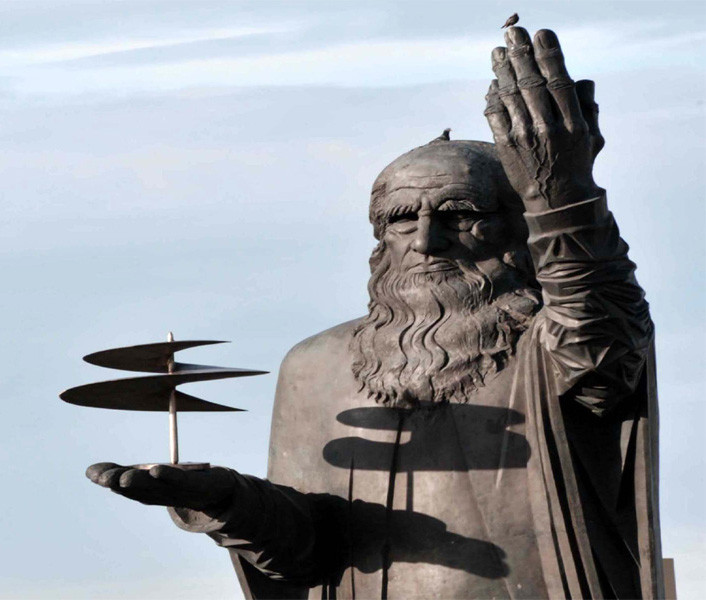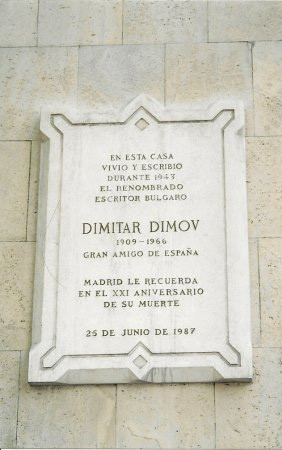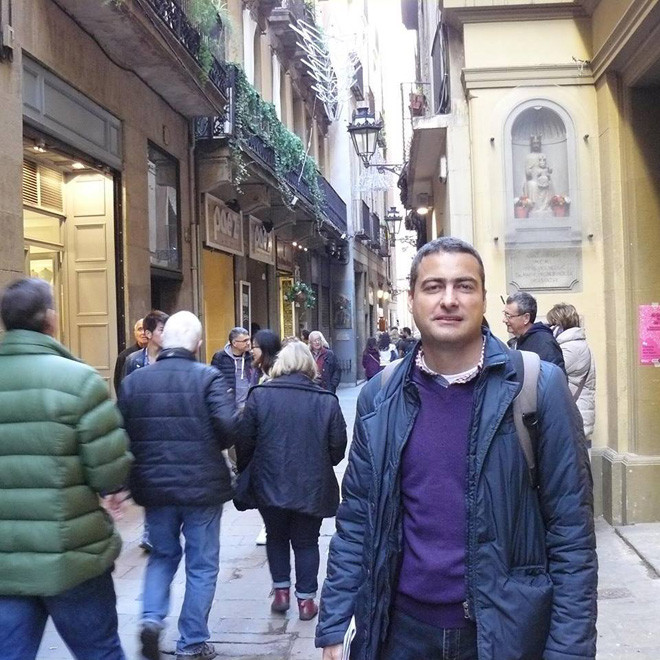 Italy is the home of some of the greatest sculptors and painters in the world but the statue of Leonardo da Vinci at Rome’s Fiumicino Airport is the work of Bulgarian sculptor Assen Peykov. However, few Bulgarians have heard about him. In Italy the sculptor is better-known and the small square in front of his home, near the Colosseum is named after him. This is how the place preserves the memory of the Bulgarian talented sculptor near the legendary Margutta Street, where Pablo Picasso and Salvador Dali used to work. "Bulgarian places" outside Bulgaria exist in Spain, Romania, Albania, North Macedonia, Norway, Ukraine and others. We have learned more about them from young traveler Daniel Pangev, who has described these “particles” of Bulgarian memory in his book "Captured Moments from Near and Far."
Italy is the home of some of the greatest sculptors and painters in the world but the statue of Leonardo da Vinci at Rome’s Fiumicino Airport is the work of Bulgarian sculptor Assen Peykov. However, few Bulgarians have heard about him. In Italy the sculptor is better-known and the small square in front of his home, near the Colosseum is named after him. This is how the place preserves the memory of the Bulgarian talented sculptor near the legendary Margutta Street, where Pablo Picasso and Salvador Dali used to work. "Bulgarian places" outside Bulgaria exist in Spain, Romania, Albania, North Macedonia, Norway, Ukraine and others. We have learned more about them from young traveler Daniel Pangev, who has described these “particles” of Bulgarian memory in his book "Captured Moments from Near and Far."
 Although the biographies of poet Pencho Slaveikov and writer Dimitar Dimov are known and studied at school, Daniel Pangev told us that Slaveikov passed away in Italy in a small village overlooking Lake Como, while Dimitar Dimov lived for a year downtown Madrid, near the Prado Museum. Daniel Pangev has made the museum workers acquainted with the fact that there was a plaque in memory of this great Bulgarian writer near the museum. Dimov’s popular book "Doomed Souls" is set in Spain during the civil war.
Although the biographies of poet Pencho Slaveikov and writer Dimitar Dimov are known and studied at school, Daniel Pangev told us that Slaveikov passed away in Italy in a small village overlooking Lake Como, while Dimitar Dimov lived for a year downtown Madrid, near the Prado Museum. Daniel Pangev has made the museum workers acquainted with the fact that there was a plaque in memory of this great Bulgarian writer near the museum. Dimov’s popular book "Doomed Souls" is set in Spain during the civil war.
Today, when we can travel freely around Europe, it is not difficult to find these Bulgarian spots. According to Daniel, such spots can be found thousands of miles away for the country.
“I will start from a country far to the north, where I never expected to find any Bulgarian trace related to our history,” Daniel Pangev says and adds. “I am talking about Norway, where I found a memorial plaque on the wall of the Oslo municipality donated by Bulgaria as a symbol of gratitude to Fridtjof Nansen. There I found out why there was a central boulevard in Sofia named after the polar explorer. In the position of High Commissioner for Refugees, he created the so-called Nansen passport. With it thousands of Bulgarian refugees from Macedonia and Thrace in the years before and during the First World War crossed borders and found salvation.”
Daniel also told us that in the heart of Europe – Switzerland, there was a place preserving a piece of Bulgaria through the descendants of Louis Eyer. "The Swiss with Bulgarian Heart", as people call him, fought as a Bulgarian officer during the Balkan War in 1912, and later on during World War I. In his book "Pro Bulgaria", published in French in 1913, he advocated for the Bulgarian national cause.
According to Daniel Panguev, many of the spiritual places linked to Bulgaria are situated mostly in neighboring Balkan countries. In Central Albania, at the foot of Mount Tomorr, one of the oldest and most beautiful cities, Berat, captivates with its magnificent architecture and cobblestone streets, he says. From 9th to the 11 century Berat was part of the First Bulgarian Kingdom, and also part of the Bulgarian Ohrid Archbishopric. There was the seat of St. Kliment, before he became ‘Ohridski.’ In fact, Velitsa, Belitsa, Belgrad, Beligrad were the Bulgarian names of Berat. The relics of St. Gorazd and St. Angelarius are kept there.
 “In North Macedonia I met Pande Eftimov, who recently passed away," Daniel goes on to say. "He was a human encyclopedia and he knew every Bulgarian place. He told me many interesting stories about the fate of Bulgarians in these lands. The message he left for today's Bulgarian generation is to find its roots and be more tolerant to the people of the Republic of North Macedonia. For years, they have been subjected to propaganda and assimilation and we should not be angry that some of them call themselves Macedonians,” Pangev says.
“In North Macedonia I met Pande Eftimov, who recently passed away," Daniel goes on to say. "He was a human encyclopedia and he knew every Bulgarian place. He told me many interesting stories about the fate of Bulgarians in these lands. The message he left for today's Bulgarian generation is to find its roots and be more tolerant to the people of the Republic of North Macedonia. For years, they have been subjected to propaganda and assimilation and we should not be angry that some of them call themselves Macedonians,” Pangev says.
Another remarkable person and living memory of Bulgarian history in Romania is Bulgarian from Banat Prof. Luca Velchov. “He showed me the inns where Bulgarian revolutionaries gathered and the mill in which Botev and Levski spend the winter of 1868. He showed me the hotel where Ivan Vazov stayed during his visits to Romania, as well as the building of the former photographic studio, where some of the most famous portraits of Vasil Levski were made.”
Unfortunately, most of the places described by Daniel Pangev are in poor condition as "living wounds of our history and culture". That is why he sees his work of finding and describing such places as a mission, in order for the next generations of Bulgarians to appreciate them.
English: Alexander Markov
Photos: courtesy of Daniel PangevBulgaria is increasingly becoming part of the general trend and dynamics of European citizens changing their location. There are no inhospitable European countries, rather it is a matter of policies and different interests of the..
The 10 main risks are facing the country in the coming decade, shows a national expert study entitled "Ten years, ten risks for Bulgaria" , BTA reports. "Deterioration of the education system" is the top risk cited by the poll. "Further..
You tell me what you have on your table so I can tell you what you are celebrating. This is a joking way of looking at the Bulgarian calendar of holidays from ancient times to the present day. The truth is that holiday meals have always been a very..
The 10 main risks are facing the country in the coming decade, shows a national expert study entitled "Ten years, ten risks for Bulgaria" , BTA reports...
Bulgaria is increasingly becoming part of the general trend and dynamics of European citizens changing their location. There are no..

+359 2 9336 661
